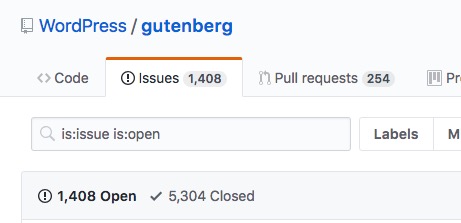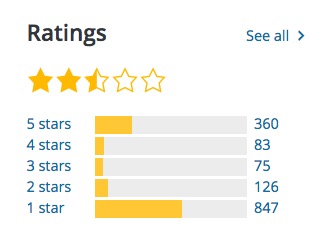Most business owners outside of the WordPress community are likely not aware that big changes are coming to WordPress. WordPress 5.0 was released on December 6, 2018 and with it comes the Gutenberg WordPress Editor. The Gutenberg Handbook describes Gutenberg as an entirely different way of creating and editing posts, which “introduces new frameworks, interaction patterns, functionality, and user experiences for WordPress.” In short, the old WordPress editor will be gone, and a block editor will take over.
Gutenberg is the default and only editor on WordPress 5.0 — they have pushed this major, breaking change directly into the WordPress core code. You can install a “Classic Editor” plugin that will bring back the old interface, but this is only a temporary tactic and will not be supported by WordPress after December 2021.
Why Gutenberg?
There has been a lot of conjecture, but it appears as if WordPress wants to compete with Squarespace and Wix, and they see this as the best route to do so.
The reaction to Gutenberg so far has been mixed. At a talk I gave a little over a year ago, agencies, freelancers and developers were already beginning to ask one another how this might affect them and their WordPress clients. I’ve seen several demos of Gutenberg since that time, and have not once been impressed by the performance or usability of the new interface.
It’s clunky, it’s not intuitive, and although WordPress developers have been working around the clock to resolve issues, it’s still quite buggy. As of the launch date of December 6, there were still 1,408 open issues.
Even well-respected developers that support Gutenberg in principle believe that it is too soon to release it. (See more here and here).
If it were only user interface problems that business owners were facing, or a steep learning curve, that would be one thing — after all, change is scary for a lot of people. A few bugs from a brand new major platform revision can even be forgivable if caught and corrected quickly. My biggest concerns with regard to Gutenberg are as follows:
- Compatibility with current plugins and themes: My clients have anywhere from a few to a few dozen plugins. Most of their sites were built using page builders. Although many of the major theme and plugin developers have scrambled to make a best effort toward becoming compatible with Gutenberg, the general consensus is that things are going to break, and they will break further as Gutenberg is expanded elsewhere in WordPress code in future development phases. Some people will argue that all sites should be rebuilt using a Gutenberg-friendly theme. Who is going to pay for these rebuilds? For many small business owners, this is not a viable option; as most business owners will resent the unplanned expense of a redesign being forced upon them.
- Accessibility: About a month ago, WordPress Accessibility Team lead Rian Rietveld resigned, citing challenges in making Gutenberg accessible for those with disabilities. Though Gutenberg currently has substantial accessibility issues, WordPress is not willing to postpone the release to complete an independent audit. This shows a lack of care for people who use WordPress-built sites to participate productively in every day life when their disability might otherwise hinder them from doing so. Inadequate accessibility needs to be addressed if WordPress is going to adhere to their own Accessibility Coding Standards.
- Technical issues: Beyond the compatibility issues outlined earlier, developers have raised concerns about the way Gutenberg stores information in the database and how that affects things on a number of levels: SEO, migrating content to other systems, and more. Backwards compatibility issues, no markdown support, and a lack of responsive column functionality have also been cited as flaws.
What Now?
With almost twice as many 1 star ratings as four and five star ratings combined, Gutenberg has not yet even come close to winning the hearts of the majority. In my opinion and experience, WordPress and Gutenberg have a long, long way to go. Until then, my plan for myself and my clients is as follows:
- All websites have been updated to the most recent version, WordPress 4.9.8.
- Automatic updates are turned off for every site.
- The Classic Editor plugin has been turned on for every site.
I am writing every one of my clients to give them a summary of my thoughts and findings and offering them one of four solutions:
- Do not update to WordPress 5.0, but keep plugins and themes up to date as much as possible. Hold out until forced to update or move to a different platform.
- Update their site in a test environment to see if it still works properly after being updated to WordPress 5.0, with the understanding that it may need to be redesigned if incompatibilities are found.
- Complete a full site redesign with a Gutenberg-friendly theme
- Migrate their current site to a different platform, such as ClassicPress
The first option for my clients is only a temporary solution. The second two options will result in increased cost to the business owner and necessary retraining to become familiar with the Gutenberg interface. The fourth option, however, offers both hope and an affordable alternative.
ClassicPress
ClassicPress is a modified and enhanced version of WordPress that serves the business website market. Community-led, ClassicPress offers an alternative solution for businesses who choose not to redesign, move platforms entirely, or accept Gutenberg as their only option. The Alpha One release of ClassicPress has been received with much positive feedback and the developers are now working on the Beta release.
ClassicPress offers all the best features and functionality of WordPress, but without the hassle of Gutenberg. As ClassicPress evolves, they will make further community-driven changes to enhance the product and further tailor it to the business website market.
My business focuses on the smallest of business owners; solopreneurs, startups, and businesses with five employees or less. I am passionate about helping them make their mark in the world, and enjoy being an active collaborator with them as they realize their dream for their business. I am often their sole technical advisor, and I take that role very seriously. As such, I have a vested interest in seeing ClassicPress succeed, and that is why I’ve accepted a position as a founding committee member and Design Team Lead at ClassicPress.
All of us at ClassicPress are excited about the future! We have a clear vision and are creating a path forward that meets the needs of the business community. You don’t have to be a developer to help with ClassicPress; we need volunteers from all areas of expertise. If you’d like to be involved, head over to ClassicPress to learn more.
Featured Image by Xu Haiwei on Unsplash
*Note: This post was updated on December 6, 2018.




